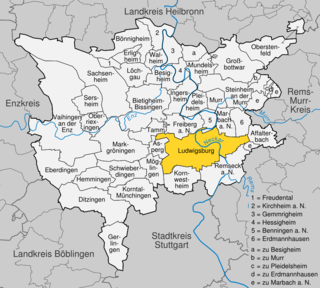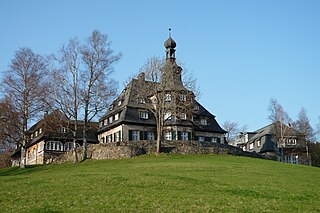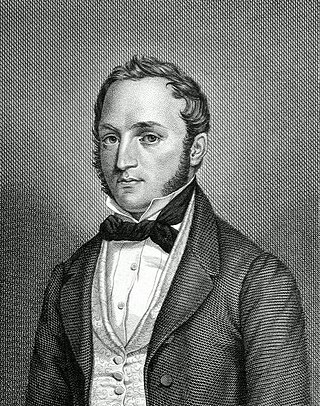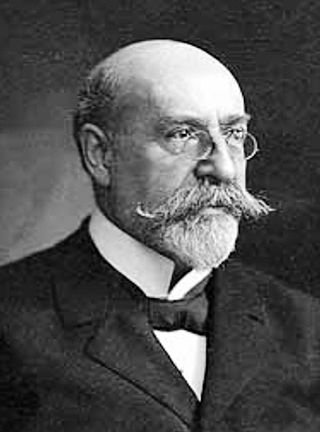Related Research Articles

Heidelberg is a city in the German state of Baden-Württemberg, situated on the river Neckar in south-west Germany. As of the 2016 census, its population was 159,914, of which roughly a quarter consisted of students.

Maximilian, Margrave of Baden, also known as Max von Baden, was a German prince, general, and politician. He was heir presumptive to the throne of the Grand Duchy of Baden, and in October and November 1918 briefly served as the last chancellor of the German Empire and minister-president of Prussia. He sued for peace on Germany's behalf at the end of World War I based on U.S. President Woodrow Wilson's Fourteen Points and took steps towards transforming the government into a parliamentary system. As the German Revolution of 1918–1919 spread, he handed over the office of chancellor to SPD Chairman Friedrich Ebert and unilaterally proclaimed the abdication of Emperor Wilhelm II. Both events took place on 9 November 1918, marking the beginning of the Weimar Republic.

Goethe University Frankfurt is a public research university located in Frankfurt am Main, Germany. It was founded in 1914 as a citizens' university, which means it was founded and funded by the wealthy and active liberal citizenry of Frankfurt. The original name in German was Universität Frankfurt am Main. In 1932, the university's name was extended in honour of one of the most famous native sons of Frankfurt, the poet, philosopher and writer/dramatist Johann Wolfgang von Goethe. The university currently has around 45,000 students, distributed across four major campuses within the city.

Johann Peter Hebel was a German short story writer, dialectal poet, Lutheran theologian and pedagogue, most famous for a collection of Alemannic lyric poems and one of German tales.

Ludwigsburg is a city in Baden-Württemberg, Germany, about 12 kilometres (7.5 mi) north of Stuttgart city centre, near the river Neckar. It is the largest and primary city of the Ludwigsburg district with about 94,000 inhabitants. It is situated within the Stuttgart Region, and the district is part of the administrative region (Regierungsbezirk) of Stuttgart.

Weinheim is a town with about 43,000 inhabitants in northwest Baden-Württemberg, Germany. It is in the Rhine-Neckar Metropolitan Region, approximately 15 km (9 mi) north of Heidelberg and 10 km (6 mi) northeast of Mannheim. Weinheim is known as the "Zwei-Burgen-Stadt", the "town of two castles", after two fortresses overlooking the town from the edge of the Odenwald in the east.

The Lessing-Gymnasium is the oldest Gymnasium in Frankfurt. Named after Gotthold Ephraim Lessing, it was founded in 1519 by the city council.

Birklehof School is a progressive educational boarding school and grammar school with a holistic approach located in Hinterzarten in the High Black Forest in Germany, approximately 25 km from Freiburg. It is a private coeducational secondary school. Currently, the school has approximately 230 students, 170 of whom are boarders who live on campus. The school was established by educator Kurt Hahn in 1932 and from the beginning accepted girls and boys. Under the Nazi regime, Hahn was forced to emigrate to Scotland where he founded Gordonstoun School as well as later Outward Bound, Round Square and the United World Colleges.

Schwalmstadt is the largest town in the Schwalm-Eder district, in northern Hesse, Germany. It was established only in 1970 with the amalgamation of the towns of Treysa and Ziegenhain together with some outlying villages to form the town of Schwalmstadt.

Friedrich Daniel Bassermann was a German liberal politician who is best known for calling for a pan-German Parliament at the Frankfurt Parliament. He emphasized the value of a national self-esteem based on progress and freedom.
Walter Friedrich Gustav Hermann Otto was a German classical philologist particularly known for his work on the meaning and legacy of Greek religion and mythology, especially as represented in his seminal 1929 work The Homeric Gods.
Karl Ludwig Reinhardt was a German classical philologist.

The Wilhelm-Ernst-Gymnasium is a secondary school on Herderplatz 14 in Weimar, Germany. Founded in 1712 by Duke William Ernest of Saxe-Weimar, it is the oldest school building in the city. Numerous notable figures such as Johann Gottfried Herder, Johann Heinrich Voss, Friedrich Wilhelm Riemer and Johann Karl August Musäus studied here. It is a designated historic site and is one of the few secular buildings of the pre-classical period still remaining in Weimar. It is prominently located in the urban center and is one of three sites forming the UNESCO World Heritage Site Classical Weimar, created in 1998.
The Burgschule or Oberrealschule auf der Burg was a secondary school (Oberrealschule) located originally in central Königsberg, Germany, and later in the suburban Amalienau quarter. It was the fourth oldest school in the city, behind Altstadt Gymnasium, Kneiphof Gymnasium, and Löbenicht Realgymnasium.

Friedrich von Weech was a German historian and archivist.
Gerhard Storz was the son of a Lutheran pastor from Württemberg who at various stages distinguished himself in theatre productions, as a scholar, an educationalist, a politician and an author-journalist, sometimes pursuing one career at a time and sometimes several in combination. Throughout his adult life he liked to see himself as a "language therapist". "Human speech seems to have been encoded, sealed into formulaic structures, and pressed into service for mechanistic operations", he once wrote.

The Ernestine Gymnasium is a humanistic and modern gymnasium in Gotha, Germany, the successor of the Illustrious Gymnasium, founded in 1524, which in 1853 was merged with the recently founded Real-Gymnasium Ernestinum, named in honour of Ernest I, Duke of Saxe-Coburg and Gotha. The merged school continued to be known as the Ernestinum. Until 1947, when it was closed, it was considered the oldest gymnasium in the German-speaking world. It was re-founded in 1991, shortly after German reunification.

Johann Georg Schlosser was a German lawyer, historian, politician, translator and philosopher. He is most known for having married Cornelia Schlosser, née Goethe, the sister of famous German playwright Johann Wolfgang von Goethe.

The Freies Deutsches Hochstift is a literary association based in Frankfurt, Hesse, Germany. It is the owner of the Goethe House, the place where the playwright and poet Johann Wolfgang von Goethe was born and spent his early years, which it operates as a museum. The Hochstift also manages the Deutsches Romantik-Museum, a museum dedicated to German Romanticism which opened in 2021.
References
- 1 2 3 4 5 6 7 Martin Kilber (1932). "Reinhardt, Karl". Lexikon der Pädagogik der Gegenwart. Herder & Co. G.M.B.H Verlagsbuchhandel, Freiburg i. B. & Leibniz-Institut für Bildungsforschung und Bildungsinformation (DIPF). p. 699. Retrieved 16 March 2022.
- 1 2 3 4 5 6 7 8 "Reinhardt, Karl Paul Friedrich (Hessische Biografie)". Landesgeschichtliches Informationssystem Hessen (LAGIS), Marburg. Hessisches Landesamt für geschichtliche Landeskunde. 15 April 2021. Retrieved 16 March 2022.
- ↑ Reinhard Frost. "Reinhardt, Karl (1849-1923)". Frankfurter Personenlexikon. Frankfurter Bürgerstiftung. Retrieved 16 March 2022.
- ↑ Ed. Friedrich Wilhelm Graf (22 September 1915). Ernst Troeltsch an Friedrich Meinecke .... Footnote 3. De Gruyter. p. 143. ISBN 978-3110581249 . Retrieved 16 March 2022.
{{cite book}}:|work=ignored (help) - ↑ Albert Henrichs (September 1986). "Euripides and Socrates: A Fragile Connection". The Last of the Detractors: Friedrich Nietzsche's Condemnation of Euripides. Duke University Libraries (Greek-Roman-Byzantine studies). p. 390. Retrieved 16 March 2022.
- 1 2 3 "Reformschulen". Meyers Großes Konversations-Lexikon. Henricus - Edition Deutsche Klassik GmbH, Berlin. 1908. pp. 693–695. Retrieved 17 March 2022.
- ↑ "Schwerpunkt Englisch bilingual / IB-Diplom". Weltbürger werden. Goethe-Gymnasium, Frankfurt am Main. Retrieved 17 March 2022.
- ↑ Momme Brodersen (September 2012). Reformgymnasium mit Realschule. Siedler Verlag. p. 14. ISBN 978-3886809431 . Retrieved 17 March 2022.
{{cite book}}:|work=ignored (help) - ↑ Hartwin Spenkuch; Rainer Paetau (2010). Kulturstaatliche Intervention, schulische Expansion und Differenzierung als Leistungsverwaltung (1866 bis 1914/18) .... Höhere Schulen: Gymnasien, Real- und Realprogymnasien, Mädchenschulen, Mittel- und Realschulen (PDF). Berlin-Brandenburgischen Akademie der Wissenschaften & Akademie Verlag GmbH, Berlin. ISBN 978-3-05-004656-3 . Retrieved 17 March 2022.
{{cite book}}:|work=ignored (help) - ↑ "Gründer der Schule Schloss Salem: Max von Baden". Onow of the most majesrtic imperial monasteries in Southern Germany: Salem Monastery and Palace. Staatliche Schlösser und Gärten Baden-Württemberg. Retrieved 18 March 2022.
- ↑ "... Prinz Max und Salem". Prinz Max von Baden, ein Mann an einer Zeitenwende. Dr. Christoph Bühler i.A. Landeskunde online, Heidelberg. 2 June 2017. Retrieved 18 March 2022.
- ↑ Jens Brachmann (2015). Die Schulen Schloss-Salem. Verlag Julius Klinkhardt. pp. 72–74. ISBN 978-3781520677 . Retrieved 18 March 2022.
{{cite book}}:|work=ignored (help) - ↑ Michael Knoll (2011). "Schulreform Through "Experiential Therapy": Kurt Hahn – An Effiacious Educator" (PDF). Catholic University Eichstaett. Retrieved 18 March 2022.